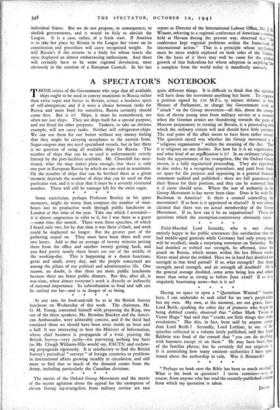Some statistician, perhaps Professor Bowley in his spare moments, might
do worse than compute the number of man- hours lost to productive work through public luncheons in London at this time of the year. Take one which I attended— it is almost ungracious to refer to it, for I was there as a guest —some time this month. There were three speeches, of which I heard only two, for by that time it was three o'clock, and work could be neglected no longer. But the greater part of the gathering stayed on. They must have been there well over two hours. Add to that an average of twenty minutes getting there from the office and another twenty getting back, and you find pretty nearly three hours cut out of the middle of the working-day. This is happening at a dozen functions, great and small, every day, and the people concerned are among the pillars of our political and administrative life. One reason, no doubt, is that there are more public luncheons because there are fewer public dinners. But this, after all, is war-time, when almost everyone's work is directly or indirectly of national importance. Its subordination to food and talk can be earned too far—and is in danger of so being.


























 Previous page
Previous page